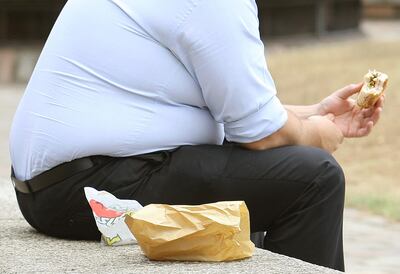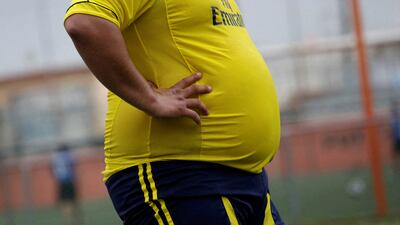Researchers have discovered a strong link between weight gain in young adulthood and an increased risk of fatal prostate cancer later in life.
By analysing data from more than 250,000 men in Sweden, the scientists established a correlation between weight gain over a man's lifetime and the development of the disease.
They said significant weight gain between the ages of 17 and 29 can increase the risk by up to 27 per cent.
Dr Marisa da Silva from the department of translational medicine at Lund University in Malmo stressed the importance of understanding controllable factors that cause prostate cancer, such as weight gain.
Well-known risk factors – such as increasing age, family history and certain genetic markers – cannot be changed.
Dr da Silva explained to The National the possible mechanism underlying this connection. “One theory suggests that a growth hormone known as IGF-1, which tends to be elevated in people with obesity, is implicated in the development of prostate cancer.
“This hormone might play a significant role in early adulthood or be fuelled by a steep weight gain, thereby increasing the risk for prostate cancer.”
Prostate cancer is the most prevalent cancer in men in the UK, with about 52,000 cases and almost 12,000 deaths a year.
Past studies have indicated that excess body fat amplifies the risk of fatal prostate cancer.
To investigate this correlation further, Dr da Silva and her team analysed data on 258,477 men taking part in the Obesity and Disease Development Sweden study from 1963 to 2014.

These men, who were free of prostate cancer when they joined the study, were monitored until 2019, with their weight measured at least three times between the ages of 17 and 60.
The data revealed that 23,348 participants were diagnosed with prostate cancer, with an average age of 70, and 4,790 died from the disease.
The researchers calculated that weight gain of 1kg a year between the ages of 17 and 29 was associated with a 10 per cent greater risk of aggressive prostate cancer and a 27 per cent higher risk of fatal prostate cancer. “The association is strongest for aggressive prostate cancer”, Dr da Silva told The National.
She described the potential biological mechanism behind this.
“Previous research has implicated elevated concentrations of insulin-like growth factor-1 (IGF-1), a hormone involved in cell growth and development, with an increased risk of prostate cancer,” she said.
“Obesity and significant weight increase may boost levels of this hormone, fuelling the development of the cancer.”
Regarding the risk for younger men diagnosed with prostate cancer, Dr da Silva said that they have not yet completed that specific analysis, “but it would be excellent to follow up on this aspect.”
The study concluded that preventing weight gain during young adulthood might help reduce the risk of aggressive and fatal prostate cancer later in life.
Despite the uncertainty about whether it's the weight gain itself or the prolonged period of being overweight that drives this association, Dr da Silva affirmed the importance of preventing excessive weight increase in young men to curb the onset of prostate cancer.
She told The National that maintaining a balanced weight early and throughout adulthood can support healthier lifestyles.
This early research, still awaiting peer review, was revealed at the European Congress on Obesity held in Dublin, Ireland.








